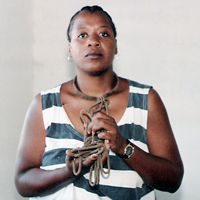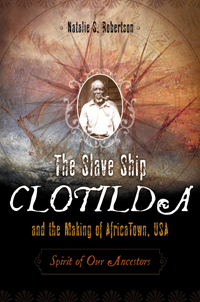
Inside…
History professor tells the story of AfricaTown, USA

Dr. Robertson stands in chains in a slave port during her visit to Africa to research the origins of the people of AfricaTown.
Few people are aware that the transatlantic slave trade consisted of both a "legal" and an "illegal" trade that began after Jan. 1, 1808. Notwithstanding legislative prohibitions against slave smuggling, American citizens continued to smuggle African captives into the United States up and beyond the threshold of the Civil War.
The Slave Ship Clotilda and the Making of AfricaTown, USA written by HU Associate Professor of History Dr. Natalie Robertson, unveils the story of the transatlantic smuggling expedition of the slaver Clotilda during the slave trade's illegal period. Furthermore, this book dramatizes the plight of her captives from the point of capture in the West African interior to the point of disembarkation in Mobile, Ala. in 1860. The story traces the specific means by which the captives triumphed over their tragedy.
Robertson is an award-winning researcher and scholar who holds a Bachelor of Arts degree in history from the University of Detroit; a Master of Arts degree in museum studies from Hampton University; and a Master of Arts degree, as well as a Ph.D. in American studies from the University of Iowa. At HU, she teaches courses in Khemetic history, West African history, and African-American history. Her areas of specialization include the trans-Atlantic slave trade and African material culture.

"The Slave Ship Clotilda" by
Dr. Natalie S. Robertson
Q. Today, African Americans have many books that reference the history of early America. What makes your book different?
A. Slavery is one dimension of the black experience in America. It was important for me to give living answers to questions of the past. Our history is diversified beyond Alex Hailey's "Roots." I made it a goal to get the untold story from a personal point and interview the Africans themselves.
Q. What were some of the road blocks you faced while researching for your book?
A. Researching information about this topic always brought up lots of questions. Every time I would find out the answer to one question it raised an even bigger question. At the time, there were not a lot of books that showed history from the African's view in America. From day one, I always wanted to uncover the valid voice of Africa. That was a big part of the process. Then, as my research grew even further and began to travel to Nigeria and Benin, it became a matter of making the importance of this history relate to a newer generation.
Q. Being a professor at HU and writing a book seems like a lot to handle. Do you feel that you have to go above and beyond the call of duty with balancing both your book and teaching?
A. Absolutely! I don't know that all professors can do what I do. I can't speak for them. Maybe that's part of the benefit of my having a passion for finding the truth. I did my best work, and I don't question my own capabilities. I just dig in and start working and try to come up with ideas and take it from there.
Q. The fact that you have been able to maintain a career of your caliber is nothing short of amazing. What are your ideas about education?
A. I believe research is the foundation for teaching excellence. By conducting primary field research, professors develop the intellectual alertness necessary for contextualizing and synthesizing diverse data, in a manner that makes the information comprehensible to students who question the relevancy, and the applicability of ideas.
-Amanda Mobley